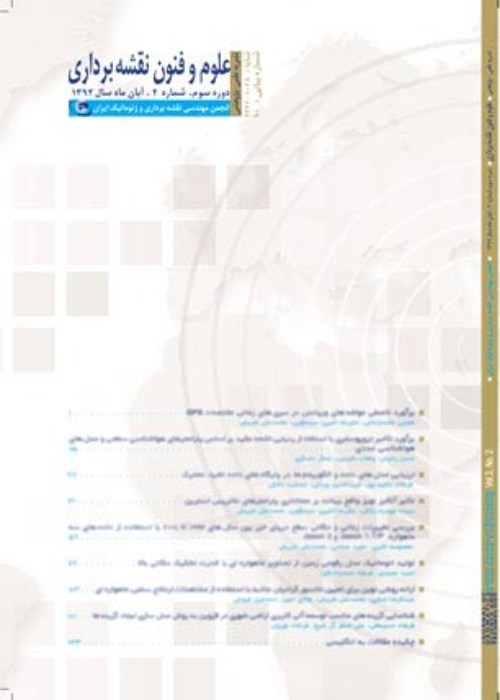Extraction of Seismic Patterns using Fuzzy Clustering Algorithms Optimized by Particle Swarm Optimization
Author(s):
Abstract:
As a common method in data mining, pattern recognition within seismic data using clustering leads to the extraction of valuable information from large databases. Categorization of clustering algorithms is neither straightforward nor canonical. Clustering algorithms can be divided into four broad classes of hierarchical, density-based, grid-based, and partitioning methods. The application of these methods depends on the kind and nature of problem. From the labeling and assignment point of view, clustering algorithms can be divided into hard and soft methods. In the hard clustering, each data belongs to one and only one cluster while in soft (or fuzzy) clustering; each data belongs to different clusters with different degrees of membership. In the field of seismology and with application of hazard analysis, it is an essential task to break an area into different regions with more or less similar seismological characteristics. So it is needed to use clustering algorithms. For data mining and clustering analysis among seismic catalogs, some issues should be considered, such as, among an active seismic area, there are different regions with different rates of seismicity, As a result, the density and number of events are not the same in different regions or seismotectonic provinces, the earthquake events are mainly distributed among different segments of major faults, there are different seismotectonic regions among an area, therefor seismic characteristics in a region vary gradually and there are not abrupt changes in these characteristics. Thus, it may be a more proper approach to partition earthquakes based on the fuzzy clustering methods that tend to investigate realistic data. Although many clustering algorithms have been proposed so far, these algorithms are very sensitive to initial conditions and pretty often get trapped in local optimum solutions so they couldnt find real clusters in space of problem. Therefore, some other global optimal searching algorithm should be used to find global clusters. The clustering problem may be considered as an optimization problem in general. Metaheuristics are widely renowned as efficient approaches for many hard optimization problems including cluster analysis. Metaheuristics uses an iterative search strategy to find an approximate optimal solution using a limited computation resource, such as computing power and computation time. Therefore, the present paper suggests some metaheuristics algorithms to solve the problems associated with clustering algorithms, Gustafson Kessel and Fuzzy c-means. The two algorithms called PSO-GK and PSO-FCM, respectively then they are applied on synthetic seismic data as well as real seismic data acquired across Iran, with the results validated using validity clustering indexes such as fuzzy hyper volume (FHV), average partition density (APD) and partition density (PD). These indexes show the clear separation between the clusters, minimal volume of the clusters, and maximal number of data points concentration in the vicinity of the cluster centroid. A low value for FHV and high values for APD and PD indexes would ideally indicate a good partition. The amount of FHV index in PSO-GK algorithm for synthetic seismic data is 0.4272 and for real seismic data acquired across Iran is 0.0941 better than this index in PSO-FCM algorithm. The two other indexes are also achieved better amounts in PSO-GK algorithm than PSO-FCM algorithm. Based on the comparison results, the proposed Gustafson-Kessel approach-based algorithm was found to be more appropriate for the analysis of seismic data.
Keywords:
Language:
Persian
Published:
Journal of Geomatics Science and Technology, Volume:6 Issue: 4, 2017
Pages:
17 to 28
magiran.com/p1702291
دانلود و مطالعه متن این مقاله با یکی از روشهای زیر امکان پذیر است:
اشتراک شخصی
با عضویت و پرداخت آنلاین حق اشتراک یکساله به مبلغ 1,390,000ريال میتوانید 70 عنوان مطلب دانلود کنید!
اشتراک سازمانی
به کتابخانه دانشگاه یا محل کار خود پیشنهاد کنید تا اشتراک سازمانی این پایگاه را برای دسترسی نامحدود همه کاربران به متن مطالب تهیه نمایند!
توجه!
- حق عضویت دریافتی صرف حمایت از نشریات عضو و نگهداری، تکمیل و توسعه مگیران میشود.
- پرداخت حق اشتراک و دانلود مقالات اجازه بازنشر آن در سایر رسانههای چاپی و دیجیتال را به کاربر نمیدهد.
In order to view content subscription is required
Personal subscription
Subscribe magiran.com for 70 € euros via PayPal and download 70 articles during a year.
Organization subscription
Please contact us to subscribe your university or library for unlimited access!


